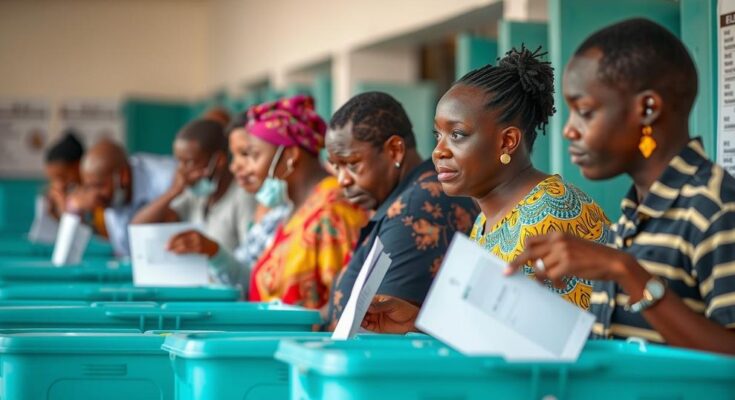Ghanaians will vote for a new president on Saturday as the country faces severe economic challenges, including high inflation and youth unemployment. The main candidates are Vice President Mahamudu Bawumia, representing the ruling party, and former President John Mahama, who seeks a comeback. Economic issues and environmental concerns will heavily influence voter decisions amidst a highly competitive election.
Ghanaians prepare to vote on Saturday for their next president amidst significant economic turmoil. The incumbent, Nana Akufo-Addo, reaches his term limit, paving the way for twelve candidates vying for the presidency. The main contenders from the ruling New Patriotic Party (NPP) and the opposition National Democratic Congress (NDC) are current Vice President Mahamudu Bawumia and former president John Mahama, who aims for a comeback reminiscent of Donald Trump’s rise in the United States.
The electorate’s focus is predominantly on the economy, exacerbated by rising inflation, unemployment, and a crisis stemming from illegal gold mining known as “galamsey.” Environmental concerns are at the forefront as communities face significant ecological damage due to unregulated mining activities. Efforts to curtail these practices have been challenging for consecutive administrations, including military interventions that yielded limited success.
Ghana’s economy is also grappling with the repercussions of the Covid-19 pandemic, resulting in increased poverty since 2020. The World Bank highlights factors such as weak growth and high inflation leading to deteriorating living standards. Inflation recently peaked at 54.1%, igniting public protests against perceived economic mismanagement. The current administration has also faced additional burdens resulting from currency depreciation and high energy sector costs.
Bawumia, an economist positioned as the architect of the government’s economic strategy, seeks to distance himself from the adverse economic impacts, claiming he only provided advisory support. Critics, including Mahama, argue he has not sufficiently addressed economic challenges during his campaign.
Mahama aims to “reset” governance if elected, promising accountability and economic reform, such as reducing taxes and banning illegal mining activities. Conversely, Bawumia’s strategy focuses on stabilizing food prices and enhancing the digital economy. With over half of Ghana’s 34 million citizens registered to vote, calls for change resonate strongly among the populace.
The election also involves parliamentary votes, requiring candidates to attain over 50% of the votes to win outright. Should no candidate achieve this, a runoff will ensue between the top two contenders. Analysts predict a highly competitive election, expressing optimism for a peaceful transfer of power in line with Ghana’s democratic practices.
The upcoming presidential elections in Ghana occur within a context of economic distress, characterized by soaring inflation and high unemployment, particularly among youth. The country faces issues stemming from illegal mining, which has damaged the environment and contributed to social unrest. Economic recovery has been hindered by ongoing global challenges and the residual effects of the Covid-19 pandemic, escalating poverty levels and complicating governance. Amid these challenges, two leading candidates emerge to contend for leadership: current Vice President Mahamudu Bawumia and former president John Mahama, both representing Ghana’s dominant political factions. Public opinion indicates a competitive race as voters prioritize economic improvement and governance efficacy.
The upcoming presidential election in Ghana is set against a backdrop of serious economic challenges, with both candidates presenting differing plans for recovery and reform. The electorate demonstrates a desire for change, driven by pressing issues of inflation and environmental degradation. With significant public participation anticipated, the successful candidate will be tasked with navigating the country’s complexities and restoring confidence in its governance. The expectation for a peaceful electoral process remains high, reflecting Ghana’s established democratic traditions.
Original Source: www.cnn.com




